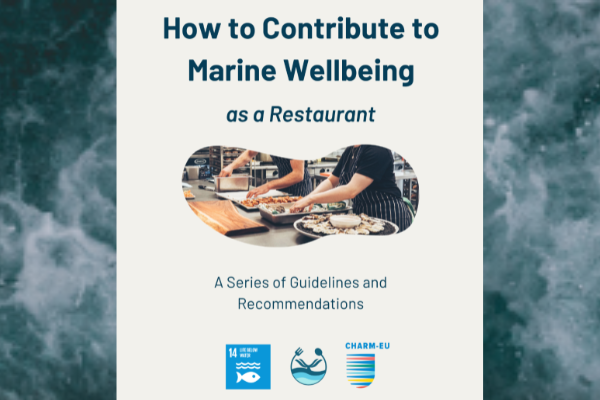During the final phase of the Master’s in Global Challenges for Sustainability, students work on a challenge-based thesis project together with societal stakeholders. One student team explored how restaurants affect marine ecosystems and what sustainable solutions can be implemented to lessen their impact. Read the project summary prepared by them to learn more about their work and the guidelines developed.

Sustainable Development Goal 14, Life below water, is one of the least prioritised and underfunded goals by the United Nations, indicating the need to reduce the negative impact on marine environments. Meanwhile, these environments are affected by the restaurant industry through the release of microplastics from packaging, use of cleaning chemicals and the serving of seafood among other. With Spain accounting for a tenth of the value of the European restaurant industry, this transdisciplinary project explores the potential of introducing an ocean-related restaurant ecolabel in Spain. The initial goal of the project was to create an ecolabel to be used by restaurants to indicate that they have taken steps towards becoming more sustainable towards the ocean. However, the combination of a literature review, five semi-structured interviews, an exploratory single case study of a restaurant, a consumer survey (n=171) and an analysis of 50 certifications led to rejecting the creation of a new ecolabel. A new label would significantly impact ocean conservation, but only under the right circumstances since high costs related to the launch and ongoing certification propose challenges. This was underlined by the fact that industry stakeholders warned the researchers of the complexity behind launching a new ecolabel, convincing the group to shift its focus.
As per the findings on consumer behaviour, many want to act sustainably, but that rarely translates into meaningful actions, possibly because they are often unaware of ecolabels and their merits. The large amount of ecolabels on the market means that the average customer cannot know all of them, and so their benefit for any individual restaurant may be questionable, especially considering the time and capital investments needed. In addition, customers rank ecolabels low when choosing a restaurant. Most successful ecolabels stem from collaborations between large NGOs and relevant market participants, which helps marketing and global expansion. Guaranteeing thorough and frequent monitoring is an essential requirement for a legitimate label. However, after completing the Master’s, no organisation would have been able to take over the work properly. Therefore, another solution had to be found to exploit the market potential and advance ocean conservation.
As shown in the restaurant case study, there is a willingness to improve from certain actors. It is an ongoing process that demands participation from the employees and long-term collaboration with suppliers. At the same time, it is often unclear where to start, which steps to take and where to invest the limited resources. The restaurant industry still suffers the repercussions of the Covid19 pandemic, and small restaurants have few options. To avoid the complexity and costs of strict measurability, the group decided to develop a set of guidelines for restaurants. This will allow restaurants to learn what their impact on their ocean is, as well as giving them opportunity to make changes where they can, avoiding the ‘all or nothing’ proposition when it comes to certification.
These guidelines can be adapted to the business’s circumstances by offering short-term and longer-term ideas for improvement. With the help of the collaborators Oceanogami, the Ocean Science Institute of Barcelona, the Fundación de Restaurantes Sostenibles and many more, the recommendations will be distributed. They guide restaurants towards a more sustainable future by training employees, offering information about seasonal products in Spain to adjust menus and recommending specific materials or (certified) products. The indicators give restaurants the opportunity to improve various aspects of their business and make a meaningful contribution to the fight to conserve our oceans.
This article is the contribution of the team of CHARM-EU master’s graduates including Sofia Edroso Stroebe, Lea Schwermer, Itziar Salazar Caballero and Marcin Chojnacki.